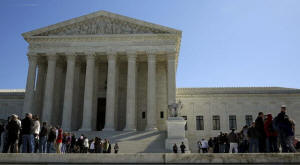|
 Divided
U.S. Supreme Court cautious about taking new cases Divided
U.S. Supreme Court cautious about taking new cases
 Send a link to a friend
Send a link to a friend
[April 05, 2016]
By Lawrence Hurley
WASHINGTON (Reuters) - With a seat vacant
possibly until next year, the U.S. Supreme Court is accepting fewer
cases and seeking compromises as it tries to avoid being hamstrung by
4-4 deadlocks on such contentious issues as abortion, birth control and
immigration.
|
|
 The court has shown a reluctance to accept new cases as it faces
the prospect of the vacancy created by the Feb. 13 death of Justice
Antonin Scalia remaining unfilled for an extended period. It has
placed only three new cases on its calendar since Scalia died: a
patent dispute and two criminal appeals, none likely to generate
much controversy. The court has shown a reluctance to accept new cases as it faces
the prospect of the vacancy created by the Feb. 13 death of Justice
Antonin Scalia remaining unfilled for an extended period. It has
placed only three new cases on its calendar since Scalia died: a
patent dispute and two criminal appeals, none likely to generate
much controversy.
In the previous five years, the court had taken up an average of
eight cases during the same period, from late February to early
April, with a high of 11 in 2013.
The court's current approach suggests the justices, led by Chief
Justice John Roberts, have an interest in avoiding the appearance
they are crippled by having a vacant seat. That desire also has been
signaled in the way the court has handled cases during the current
term, which runs through June.
So far the justices have agreed to hear eight cases in total for the
next term, which runs from this October through June 2017. That
includes five cases they agreed to hear in January before Scalia
died and is slightly below average for this time of year. The court
generally hears about 70 cases a term.

"It is beginning to look like the court is being especially
selective in choosing which cases to grant," said John Elwood, a
lawyer at the Vinson & Elkins law firm who practices before the
court.
President Barack Obama last month nominated centrist appellate judge
Merrick Garland to replace Scalia. But the seat may remain empty for
perhaps a year as Senate Republican leaders insist that Obama's
successor, who will take office next January after the Nov. 8
presidential election, fill the vacancy.
BIRTH CONTROL COVERAGE
Last Tuesday, the court took the unusual step of suggesting a
possible compromise in a dispute over objections from Christian
nonprofit employers to providing female workers insurance covering
birth control as required by Obama's 2010 healthcare law.
The justices asked the two sides to suggest ways that birth control
coverage could be provided to women through these employers'
insurance plans without any involvement on the part of the
employers.
[to top of second column] |

The court could also split 4-4 on a challenge by abortion providers
to a restrictive Texas abortion law and a lawsuit by Texas and other
states to block Obama's execution actions to protect large numbers
of people in the country illegally from deportation.
With the court evenly split with four liberals and four
conservatives, the slow pace in filling the calendar indicates an
increased cautiousness considering the real possibility of 4-4
deadlocks on anything ideologically divisive.
Such decisions leave lower court rulings in place but set no
national precedent. The court has issued two 4-4 decisions so far,
including one in a high-profile labor case.
In recent years the court has not shied away from taking up
controversial issues such as abortion, affirmative action, voting
rights, gay rights and religious rights.
It is too early to say if it will avoid controversial cases
altogether, but Scalia's absence means it may now be restricting
itself to disputes in which the justices are "more likely to reach
consensus and clarify the law," said Jeffrey Wall, a lawyer at the
Sullivan & Cromwell law firm.
(Reporting by Lawrence Hurley; Editing by Howard Goller and Will
Dunham)
[© 2016 Thomson Reuters. All rights
reserved.]
Copyright 2016 Reuters. All rights reserved. This material may not be published,
broadcast, rewritten or redistributed.
 |